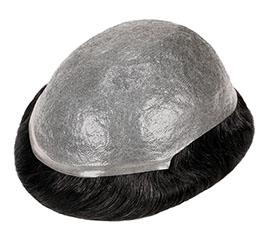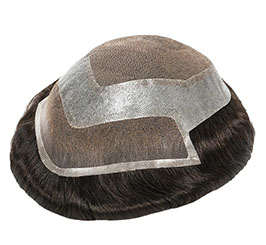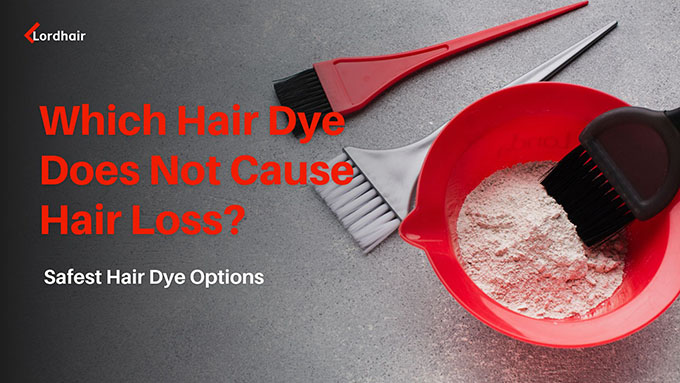Ending Hair Loss Anxiety: A New Year's Resolution
- Written by Winter Li
- | Published Jan 7, 2026
- |
- 14 min read
 Listen to the full text
Listen to the full textThe beginning of a new year often feels like a natural reset. It's when people look back, reassess habits, and think about what they want to achieve moving forward. Some resolutions are easy to talk about, like health and wealth. Others may be quieter and more personal. Confidence is often one of them.
For men dealing with hair loss, that confidence question tends to resurface at the start of the year. Not because hair loss suddenly changes, but because unresolved worries have a way of carrying over. When everything else feels ready for a fresh start, ongoing hair concerns become harder to ignore.
The key to ending hair anxiety can differ from person to person. Chasing perfect natural hair is not the only answer. Sometimes it is more related to your appearance and more ease in everyday life.

Hair Loss Resolutions Look Different for Different People
Since hair loss can be caused by different reasons and affect people in different ways, "ending hair anxiety" means something different for different men. For some, it's emotional. For others, it's practical.
Wanting to Cure the Root Cause of Hair Loss
In some cases, hair loss may be a result of nutritional deficiencies, stress, or other temporary conditions. Once the root cause is identified and properly addressed, hair growth can return to normal. In this situation, the goal is very clear: fix the cause and allow the hair to recover naturally.
Wanting to Think Less About Hair Every Day
However, not everyone can resolve hair loss at its root. Hair loss that results from genetic issues such as male pattern baldness may begin early and progress over time. This kind of hair loss can create constant mental noise, frequent checking of mirrors, adjusting hairstyles, and worrying about thinning areas. Sometimes it may happen even without realizing it. Over time, that ongoing attention becomes exhausting.
In these cases, the goal is not to get rid of the underlying cause of hair loss. It's reducing how often they have to think about it.
Wanting to Feel More Confident in Different Scenarios
Lighting, weather, photos, and social settings can all make hair feel unpredictable. Some men feel comfortable in familiar environments but uneasy when conditions change.
The key to overcoming it is maintaining a consistent look. When you are sure about what your hair will look like in different situations, you will have less anxiety related to hair and grow your confidence throughout the day.
Wanting a Hair Loss Solution That Fits Real Life
In general, most men are not seeking radical or complicated solutions. They would like to find something they can easily incorporate into their daily life: working, traveling, exercising, and socializing.
This is what most current hair loss solutions are not able to solve. If a solution has the potential to disrupt a person's lifestyle or cause them inconvenience, it can't be an effective solution no matter how well it works in theory.
Why Hair Loss Anxiety Often Persists Despite Trying Different Fixes
Hair anxiety doesn't happen because nothing is being done. In fact, many men will test various hair loss treatment options.
Temporary cover-ups can be helpful, but they usually need constant attention. Medications such as Finasteride need to be taken lifelong with possible side effects. Hair transplant is a surgical process that may involve possible risks. Additionally, this procedure is quite expensive with uncertain outcomes.
The problem that people share in common is inconsistency. Some hairstyles that worked before might not be suitable when hair loss progresses. Since it's so unpredictable, hair loss anxiety remains in mind. The key to ending hair loss anxiety is one thing: control.
When your look becomes predictable, stress will diminish. When you don't need to pay constant attention, confidence will come more easily. Hair anxiety is likely to ease when daily uncertainty is removed.
This is the difference between covering hair loss and selecting an option that provides consistency.
How Modern Hair Systems Help Men Regain Hair Peace
Modern hair systems for men are designed around that idea of reliability. Unlike the old-day toupees, they are undetectable and offer a natural look even up close. They offer consistent results in different scenarios, no matter in your daily work, social events, or workouts.
A well-fitted hair system offers immediate visual improvement without long waiting periods. More importantly, it delivers predictable results across different environments and situations. That consistency plays a major role in reducing long-term hair anxiety.
As a form of non-surgical hair replacement, hair systems are flexible and adjustable. They can accommodate the needs for different stages of hair loss, lifestyles, and comfort preferences, which makes them a practical hair loss solution for many men.
If you are considering a hair system and want to know how it compares with other hair loss solutions. Here is a quick comparison.
Hair Systems vs Other Non-Surgical Hair Loss Solutions
|
Solution
|
How It Works
|
Pros
|
Cons
|
Best For
|
|
Hair System
|
A hair piece covers the hair loss area, attached to the scalp with glue or tape
|
- Instant, natural results- Fully customizable (style/color)- Works for any level of baldness
|
- Needs maintenance (cleaning, reattachment)- Replaced every 1–6 months, depending on materials and proper care
|
Men who want a natural-looking, full head of hair fast
|
|
Scalp Micropigmentation (SMP)
|
Tattoo dots mimic shaved hair
|
- Permanent (no daily upkeep)- No adhesives- Looks like a buzz cut
|
- Not actual hair (just an illusion)- Can fade over time
|
Men who like the shaved-head look
|
|
Hair Fibers
|
Powder of Keratin fibers sprinkled onto thinning hair to make it look thicker
|
- Cheap & instant- No commitment- Easy to use
|
- Washes off daily- Only works for mild thinning (not balding spots)
|
Men with early-stage thinning
|
|
Low-Level Laser Therapy (LLLT)
|
Laser combs, caps, or helmets are used to stimulate hair growth
|
- No chemicals/surgery- Slows hair loss
|
- Slow results (6+ months)- Works best with existing hair
|
Men with mild thinning who want gradual improvement
|
|
Medications (Minoxidil, Finasteride)
|
Apply foam or take pills to stimulate hair growth
|
- FDA-approved- Can regrow some hair
|
- Side effects possible- Must use for life (or hair falls out)
|
Men who want to keep their natural hair
|
Hair System vs Hair Transplant
| Feature |
Hair Transplant
|
Hair System
|
|
Results Timeline
|
6–12 months or more
|
Immediate
|
|
Cost (Initial)
|
A significant one-time cost (May involve several sessions)
|
A lower initial cost, with regular fees for upkeep
|
|
Maintenance
|
Low (natural hair care after healing)
|
High (reattachment every 2–3 weeks)
|
|
Permanence
|
A permanent, lifelong solution using your own hair
|
A short-term solution; the unit is replaced every 1-6 months
|
|
Invasiveness
|
Surgical (scarring)
|
Non-surgical (sensitivity to adhesive)
|
|
Natural Look
|
High (grows naturally)
|
High (when properly fitted)
|
Different Hair System Goals for Different Needs
One reason hair systems help reduce anxiety is that they are not one-size-fits-all. Peace of mind comes from choosing a system that matches what you actually care about.
Different men come to hair systems with different goals, and modern hair systems are flexible enough to support all of them.
For first-time users, the priority is often reassurance. Many want a hair system that looks natural, blends easily, and doesn't require many maintenance efforts. Thin skin hair systems are often a comfortable starting point. The thin skin base is invisible and easy to manage, giving new users an easy start without feeling overwhelmed.
For experienced wearers, the focus tends to shift. Once the initial concerns fade, comfort, realism, and styling flexibility become more important. Some men choose ultra-thin skin systems for an ultimate realistic appearance, while others prefer hybrid systems that balance breathability with durability. Those who want an exact perfect match may go for custom hair systems, where you can customize almost every feature of a hair system to fit your unique requirements.
For active men, comfort during movement matters. Workouts, outdoor activities, and busy days can make heavier systems feel distracting. Breathable lace hair systems are a popular choice here, as they allow better airflow and help reduce heat buildup. When a system feels light and secure, it becomes something you forget you're wearing, which is exactly the point.
For men with sensitive scalps, hair anxiety often comes from discomfort rather than appearance. In these cases, hygiene, breathability, and long-term cleanliness matter more than anything else.
Lordhair's antibacterial hair systems series Zyrosen are favored by many users who value scalp health and hygiene. Utilizing the antibacterial technology of silver ions, ZyroSen hair systems keep bacteria away and maintain long-lasting freshness. ZyroSen hair systems are certified by SGS, CE, and FDA, so you can surely trust their quality and safety.


The key takeaway is that modern hair systems for men are designed to adapt to different lifestyles, preferences, and priorities. Whether your focus is natural look, comfort, activity, or scalp health, the right hair system can reduce daily worries and bring back a sense of control.
When your hair solution works with your life, peace of mind follows naturally.
Curious what the experience is really like with Lordhair hair systems?
★ ★ ★ ★ ★

Looks So Natural
At first, I wasn't sure about wearing a hair system, but Lordhair's product totally changed my mind. I'm really impressed with how natural it looks and how breathable it is, even when I'm out and about. The secure fit and comfort are so good, I forget I'm even wearing it. Now, I wear it every day and love it!
Start the New Year With Less Worry About Your Hair
It's important to be realistic about your resolution of ending hair loss anxiety. Ending hair anxiety doesn't mean never thinking about hair again or achieving flawless results. It means feeling comfortable in everyday situations. Not worrying about lighting, angles, or unexpected plans. Not feeling distracted by your appearance during conversations or events.
Confidence grows when hair becomes something you trust, not something you constantly monitor.
The New Year is often one of the easiest times to make changes. You have the willingness to embrace a new start, and your schedules tend to be lighter at the beginning of the year. With fewer social commitments and less workplace pressure around the holidays, there's more space to adjust to something new, whether you want to try a hair system for the first time or upgrade the one you already wear.
For many men, starting early in the year allows confidence to build gradually, without feeling rushed or drawing unnecessary attention.
Lordhair Supports You in Ending Hair Anxiety
Ending hair anxiety often comes down to finding a solution that fits naturally into your life. A consistent, natural look and the ability to feel comfortable in different situations can make everyday confidence much easier to maintain.
Lordhair focuses on creating modern hair systems designed for real-life wear. Whether you're exploring hair systems for the first time or adjusting what already works for you, our goal is to help you feel at ease with your hair, without adding extra stress.
With a wide range of options and ongoing support, Lordhair helps you move into the new year with fewer worries about your hair and greater peace of mind each day.
Expert Consultations
If you're not sure what might work for you, contact us to get professional advice.
FAQs
How can a hair system help reduce hair anxiety?
Hair anxiety often comes from uncertainty, like how your hair looks in different situations or how much attention you pay to it every day. A well-fitted hair system provides a consistent, natural look, helping you reduce daily worry and keep peace of mind.
Will people notice I'm wearing a hair system?
In most cases, people don't notice, especially when the hair system is properly fitted, styled, and matched to your age and lifestyle. People will likely only realize your hair looks great. The trick is a good quality system and correct installation.
How much effort does hair system maintenance require?
Maintenance typically depends on the base material you choose, and it usually gets easier with time. Most beginners need a period of time to get used to the routine. Thin skin hair systems are generally easier to maintain than lace systems, so they are favored by first-time users.
How long does it take to get used to wearing a hair system?
It may take a few weeks or even months for your head to fully adapt to the hair system. Many beginners report discomfort relief within the first 7-10 days. As it becomes part of your routine, comfort and confidence will build gradually.
How can I choose a suitable hair system?
To choose a suitable hair system, there are a few basics to consider: base material, hair quality, color, and density, along with your lifestyle. If you are unsure where to start, Lordhair offers guidance to help you choose a hair system that feels right for both your needs and everyday life. Feel free to contact us for a free consultation

 TALK TO US
TALK TO US EMAIL
EMAIL

